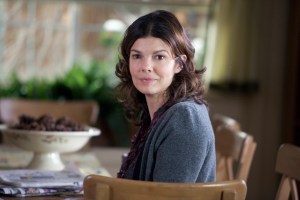
HBO
Before you read this post, switch off that rerun of The Fugitive and watch last night’s Big Love.
“This is just so incredibly effed up.” —Ben Henrickson
Language, young man! It still startles me at times when I realize that Big Love is an adult HBO drama almost entirely without swearing. If you can gauge the seriousness of the events unfolding in “The Noose Tightens,” one good way is by the rare outbursts of quasi and actual profanity, as when Margene boils over in frustration at Cara Lynn—ready to run off, as she did, with a grown man while still a minor—and lets loose the D word: “Get in the damn car!”
It’s an in-character breach for Margene, of course, since she grew up outside the orbit of either the LDS church or the compound, unlike her other spouses. But more than that, she is the fulcrum of the family’s final crisis as it heads to the series finale, her underage marriage to Bill not just the source of their legal troubles but reason to examine whether she was in fact taken advantage of, whether their arrangement was corrupt from the beginning. Painfully, and with agonizing confusion, she like many Big Love characters in these final hours is being forced to look hard at how effed up her life and marriage have been.
I’m not sure if this final run of Big Love will completely redeem the serial’s missteps over the past couple of years or equal the apex it reached in its powerful third season. After a Tilt-a-Whirl of a fourth season, the show’s denouement has been more pared down and focused, but there is still a hell of a lot of story playing out here, and at times “The Noose Tightens” felt like an hourlong “previously on Big Love” segment. The default mode of the episode seemed to be: a character is in a room, dealing with a horrible crisis; the crisis deepens; another character bursts in with an even bigger crisis. Even more so than usual on Big Love, the central characters are each dealing with multiple stressors, each of which individually would have most of us reaching for the prescription meds.
But unlike the careering plot multiplications of season four, the building crises of the final season do feel like they have a point other than distraction. These last hours have brought each member of the Henrickson marriage to examine not simply whether their marriage has become something unsustainable, but whether it was fundamentally flawed from the beginning. Sometimes the confrontation is direct, as when Barb realizes with horror that for all the compromises and adjustments she’s made to keep her marriage going, and commit to Bill’s commitment to the Principle, she could be rewarded with a jail sentence. Sometimes it’s reflected in others, as when Nicky sees, even if she can’t admit it, that she has no standing to challenge Cara Lynn’s decision to go off with Greg. Sometimes it’s both, as when Margene finds herself caught between her business and her marriage, each one convinced that the other is a pernicious cult.
That last development may have come together a little too neatly, but it also showed how necessary the Goji Blast storyline has been this season: whether or not you think the Henrickson marriage is a cult, the fact that the question came up showed how difficult it is for someone inside the marriage—especially someone like Margene, who married young—to get perspective on it. Like a cult, it’s a totalizing experience; it has its own self-reinforcing logic; and it often defines itself in terms of its enemies (Juniper Creek, for instance, which has always conveniently made Bill look better in comparison).
It’s an important point for a series about the power and abuses of faith: how do you distinguish faith from brainwashing? And as convenient as the statutory-rape plot may have been, it’s just as thematically important, especially when the series has questioned, through outsiders, whether Bill could not have suspected something about Margene’s age from the beginning. (As the investigator notes, 16 or 18, she was young—emotionally as well as in age.) The rape case is important not just to heighten the drama, but because it’s a foundational issue: are the family’s problems the result of events that have unfolded over time, and of forces that have conspired against them—or was something wrong with it from its very beginning?
When it took time to breathe amid its many, many plot developments (on top of which there were storylines like Lois’ decline and Barb’s testimony, dealt with only glancingly), Big Love showed the horror of realization through some characteristically strong performances by its lead actresses. I was especially impressed with Chloe Sevigny in this episode. Nicki can be the most broadly drawn of the three wives, but beyond the histrionics of her showdown with Cara Lynn and Greg and her abduction by Alby, there was a wonderful moment when Margene pressed Cara Lynn to tell the truth; you could see in Nicki’s face the crumbling of her certainty and the fear of losing her daughter—just before it was subsumed, Nicki-style, in righteous rage.
And by the end of the episode, of course, we saw a very different Nicki, returning to the Henrickson home as if she’d been exhumed from the grave—which in a way she was. I’m not sure how Big Love addresses and resolves every storyline in its two remaining episodes. But as Bill has faced his folly—how he has exposed his family and perhaps set back his very faith—it looks like the show has fireworks planned beyond the emotional ones. Pointedly, this season has established that Bill and the Henrickson women are armed. And it would seem that Big Love is readying its guns, literal and metaphorical, to go off in the final act.


